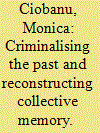| Srl | Item |
| 1 |
ID:
086257


|
|
|
|
|
| Publication |
2009.
|
| Summary/Abstract |
This article analyses the report issued by the Presidential Commission for the Analysis of the Communist Dictatorship in Romania in January 2007 within the context of the politics of memory and justice in post-communist Romania. Crucial aspects of the work of the commission, such as its history and formation, mandate and make-up, methodological and conceptual framework, and the political reactions that it generated are examined. This leads to the conclusion that while the publication of the report brought some progress in revealing the truth, it is less likely to have a similar impact on transitional justice policies.
* A shorter version of this article was presented in October 2007 at the conference 'The Dream Factory of Communism' organised by Havighurst Center for Russian and Post-Soviet Studies at Miami University, Ohio. The field work was funded by the Presidential Research Award and supported by the Institute for Ethics in Public Life at Plattsburgh State University of New York. I would also like to thank Lavinia Stan for her useful comments on an earlier version of the article.
|
|
|
|
|
|
|
|
|
|
|
|
|
|
|
|
| 2 |
ID:
141800


|
|
|
|
|
| Summary/Abstract |
This study develops and tests two arguments for how repertoires of political action are reconfigured in post-communist Romania. Using multivariate statistical analysis, it examines whether citizens' engagement in post-communist politics is linked with generic socioeconomic and attitudinal traits or, alternatively, if it is connected with selective mobilisation opportunities provided by social networks and organisations. The findings reveal that while most Romanians are politically inactive two decades after the fall of communism, those who engage in politics do so selectively and their political action repertoires are largely influenced by four mobilising agents: trade unions; political parties; social networks; and civil society organisations.
|
|
|
|
|
|
|
|
|
|
|
|
|
|
|
|
| 3 |
ID:
155859


|
|
|
|
|
| Summary/Abstract |
The article develops a typology of political strategies of coming to terms with the past as a theoretical frame of reference against which it assesses the transitional politics of memory pursued in Romanian post-communist society. It argues that after an initial ‘elusive’ strategy based on a politics of amnesia gave way to a confrontationist stance promoting a politics of anamnesis, the communist past was both politically criminalised and symbolically demonised. The article concludes by arguing that the failure of the ‘mastering the past’ paradigm epitomised by the 2006 Tismăneanu Report needs to give way to a ‘normalising’ paradigm of remembering Romanian communism.
|
|
|
|
|
|
|
|
|
|
|
|
|
|
|
|
| 4 |
ID:
171705


|
|
|
|
|
| Summary/Abstract |
Drawing on 69 interviews and information from the World Values Surveys, we examine discursive understandings of social capital in Romania. We evidence two dominant explanatory metanarratives on the weakness of social capital (‘communism’ and ‘ethnocentric individualism’) and dilemmas regarding generational and urban/rural differences, which our mixed-methods approach helps decode. Contemporary processes of institutionalisation and commodification have further weakened practices of social capital but such processes are socially approved for their potential of breaking with lingering practices of corruption, bribery and favouritism, and of achieving institutional fairness. Convergence with mature democracies is unlikely not because of passive legacies or ill-adapted actors but because people have different aspirations, well suited to the context of post-communist transformation.
|
|
|
|
|
|
|
|
|
|
|
|
|
|
|
|